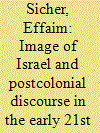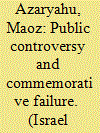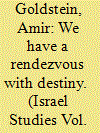|
|
|
Sort Order |
|
|
|
Items / Page
|
|
|
|
|
|
|
| Srl | Item |
| 1 |
ID:
102741


|
|
|
|
|
| Publication |
2011.
|
| Summary/Abstract |
Feminist art is currently thriving in Israel after having come a long and curvy way. Although early twentieth century Zionism promoted gender equality in the spirit of first-wave feminism, the movement never gathered the momentum needed for it to develop into second-wave feminism. While its influence could be seen in the art of the 1970s, particularly in the United States, feminist ideology remained absent from the work of women artists in Israel. This state of affairs continued until the 1990s, when a turning point occurred. The article shows the influence of second and even third-wave feminism on Israeli women's art. It also considers the reasons for lack of a distinct category of feminist art prior to the 1990s, as well as the conditions and features of its emergence, using the case of American feminist art for comparison. The article demonstrates that although Israeli women artists were initially slow to develop a second-wave feminist ideology, it took them less than a decade to make a "quantum leap" into the next theoretical and practical stage. Within a decade and a half, Israeli women artists caught up with their colleagues overseas and are now creating cutting-edge, relevant, and contemporary feminist art.
|
|
|
|
|
|
|
|
|
|
|
|
|
|
|
|
| 2 |
ID:
102729


|
|
|
|
|
| Publication |
2011.
|
| Summary/Abstract |
The essay looks at three spheres in which ideological bias and political activism work to delegitimize the State of Israel by maligning Israel and Zionism in mainstream British public discourse. Postcolonial theory is one weight against any objective treatment of the Jewish state. The demonization of Israel in the press draws on conspiracy theories and stereotypes familiar from anti-Semitic tropes. British Jews are fairly supportive of Israel, though divided on solutions to the Arab-Israel conflict, however a small group of anti-Zionist Jews assert their moral stance "as Jews" by defaming Israel's allegedly criminal activities. The analysis of public discourse in Britain in the first decade of the twenty-first century raises disturbing questions about the complex relationship between the anti-Israel campaign and latent anti-Semitism on the left and the right, and draws attention to the local context of race relations as well as the global Jihad against Israel and the West.
|
|
|
|
|
|
|
|
|
|
|
|
|
|
|
|
| 3 |
ID:
102733


|
|
|
|
|
| Publication |
2011.
|
| Summary/Abstract |
After having presented a brief overview of the relationship between Italy and Israel since its founding to the 1990s, this article analyses the reasons why the Berlusconi government decided to change the Italian foreign policy towards Israel, moving from a more pro-Palestinian stance to a clearly pro-Israel one. The international situation after 9/11 and the new state of affairs of Italian politics following the birth of the so-called Second Republic might explain such a turning-point. In particular, the post-fascist Alleanza Nazionale (AN) party was looking for legitimization by the Italian Jewish communities in order to present itself as a modern European right-wing party. Thus, AN decided to openly support Israel, thus pushing the entire government towards this position. At the same time, the birth of an Islamophobic milieu made relevant sectors of the civil society back Israel, as part of the wider battle that "the West" is conducting against "the Muslim fundamentalism".
|
|
|
|
|
|
|
|
|
|
|
|
|
|
|
|
| 4 |
ID:
102742


|
|
|
|
|
| Publication |
2011.
|
| Summary/Abstract |
The question of the Zionist passion for the land has been discredited lately by new historians and critical sociologists, who see it as an epiphenomenon, legitimizing the dislocation and disinheritance of others. In some later works, a backlash can be seen that criticizes the neglect of actors' subjectivities, while advancing research beyond previous understanding of Zionist ideology. This article examines four books, by Zali Gurevitz, Boaz Neumann, David Ohana, and Alexandra Nocke that place the phenomenological understanding of Zionism and Israeli society at the center of their research. Taken together, these four works follow the logic and development leading from the days of the early pioneers' passion, to the territorial alternatives of contemporary post-ideological age.
|
|
|
|
|
|
|
|
|
|
|
|
|
|
|
|
| 5 |
ID:
102735


|
|
|
|
|
| Publication |
2011.
|
| Summary/Abstract |
The article examines whether policymakers were successful in taking advantage of the massive immigration of the 1990s to meet the demographic objectives laid out in Israel's long-standing population dispersal policy. This policy has been one of the most consistent in Israel's history, endorsed by every government since the State's establishment. Population dispersal policy has been a key component of security, housing, economic, and land-use policy for more than sixty years. As in the 1950s and 1960s, the massive influx of one million immigrants from the former Soviet Union provided a unique opportunity to realize this policy's goals. This work examines the degree to which that opportunity was utilized through analyses of policy implementation and demographic change during and after the 1990s immigration wave.
|
|
|
|
|
|
|
|
|
|
|
|
|
|
|
|
| 6 |
ID:
102737


|
|
|
|
|
| Publication |
2011.
|
| Summary/Abstract |
Drawing on the academic literature on public art conflicts and public memory controversies, the article examines the controversy over the design for Tel-Aviv's Monument to the Holocaust and National Revival, and its failure to perform its commemorative function. It argues that underlying the controversial character of the design and the failure of the monument to perform its commemorative function was a public art conflict: the abstract design selected for the monument elicited public opposition as unfitting to represent the monument's commemorative theme.
|
|
|
|
|
|
|
|
|
|
|
|
|
|
|
|
| 7 |
ID:
102731


|
|
|
|
|
| Publication |
2011.
|
| Summary/Abstract |
The struggle between the workers' parties and the right-wing Revisionists took an increasingly central place in Zionist history beginning in the 1930s. The Labor Movement gained political hegemony during the period of the Yishuv (pre-state Israel). When Jabotinsky tried to challenge Mapai's power position he suffered a bitter defeat. Most of Israel's first 13 years were marked by political polarity between Mapai and the Herut Movement (the latter led by Begin). Herut received a thrashing in the Knesset elections in 1951 and the General Zionists (GZ) became the second largest party after riding on the wave of middle class protest against the Mapai led government austerity regime. However, it failed to exploit its broad support into a permanent electoral base that would transform the right-center bourgeoisie into a political force that would serve as an alternative to Ben-Gurion's government. In the summer of 1955, Herut replaced the GZ as the second largest Knesset party, and in 1959, Begin became head of the opposition after Herut won 17 seats, twice as many votes garnered by the GZ, which was reduced to its political size of the first Knesset elections in 1949. The key political rivalry returned to the power struggle between the Zionist left and the nationalist right.
|
|
|
|
|
|
|
|
|
|
|
|
|
|
|
|
| 8 |
ID:
102732


|
|
|
|
|
| Publication |
2011.
|
| Summary/Abstract |
We focus on the part that was played by the U.S. Administration, in particular by National Security Advisor Henry Kissinger, in the failure of efforts to bring about an Israeli-Egyptian settlement in 1973, the year in which the Yom Kippur War broke out. Documents recently declassified in the United States and Israel support that the behavior of the White House, especially of Nixon's influential NSA, Kissinger, in the Middle East arena that year not only failed to prevent war but also indeed catalyzed its outbreak. We shall claim that in the examined period Kissinger led a "stalemate policy", which in practice meant undermining any peace initiative that surfaced if it was not in accordance with Israel's position on a possible settlement. With this in mind, the Egyptian government understood that the United States would have no real interest in promoting a peace process, pressuring Israel to withdraw from the Sinai Peninsula and perhaps also from other territories occupied in the Six-Day War. This assessment prompted the Egyptians to abandon diplomacy and (together with Syria) attack Israel in October 1973. They assumed that such a move would get the White House directly involved in the peace process in the Middle East and lead to the return of Egyptian territories occupied by Israel in the Six-Day War.
|
|
|
|
|
|
|
|
|
|
|
|
|
|
|
|
|
|
|
|
|